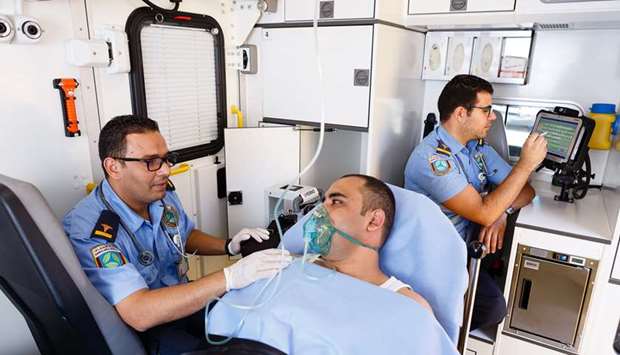Hamad Medical Corporation (HMC) has said its Ambulance Service has recorded more than 1.2mn patient encounters via its electronic patient clinical record (EPCR), helping advance the quality of care the service provides to patients.
Launched in 2016, the EPCR improves the way in which patient information is communicated between clinical teams.
The system enables clinical information about the patient’s condition to be sent through by paramedics to the hospital receiving team while the patient is still being transported in the ambulance. Then, on arrival at the hospital, the receiving nurse is able to scan the barcode on the electronic patient clinical record and the patient’s data is automatically added to the Clinical Information System.
“The introduction of the EPCR has enabled us improve the standard of care we deliver to our patients. The end result of this new technology is a more efficient and effective service for our patients,” said Rashid Andaila, senior manager of Communication Technologies at HMC’s Ambulance Service.
“The EPCR collects a wide a range of data, including patient demographic information, patient assessment information, care management details, handing over information and case details, including locations and timings,” added Andaila.
The EPCR also provides ambulance crews with reminders about clinical practice guidelines as well as medicine formulary and standard operating procedures. Staff are also provided with standardised data, which can be viewed in many formats, including algorithms, visual aids and clinical scoring. This improves staff compliance with clinical practice guidelines, HMC has said in a statement.
Demand on the Ambulance Service has increased steadily in recent years, which means a greater number of patients are benefiting from the new system. In 2019, the Ambulance Service responded to more than 350,000 calls, a 30% increase in activity since 2017.
“The introduction of the EPCR has played an important role in helping the Ambulance Service deliver high-quality emergency care to increasing numbers of patients. The system has helped improve efficiency, safety and the overall quality of care we provide," said Ali Darwish, assistant executive director of HMC's Ambulance Service.
“Our ability to build a robust research infrastructure, through the creation of high-quality data, has also been boosted by the EPCR. This has resulted in better interrogation and reporting of statistics to identify areas for service improvement, training needs and patient outcomes,” added Darwish.
The system enables clinical information about the patient’s condition to be sent through by paramedics to the hospital receiving team while the patient is still being transported in the ambulance. Then, on arrival at the hospital, the receiving nurse is able to scan the barcode on the electronic patient clinical record and the patient’s data is automatically added to the Clinical Information System.
“The introduction of the EPCR has enabled us improve the standard of care we deliver to our patients. The end result of this new technology is a more efficient and effective service for our patients,” said Rashid Andaila, senior manager of Communication Technologies at HMC’s Ambulance Service.
“The EPCR collects a wide a range of data, including patient demographic information, patient assessment information, care management details, handing over information and case details, including locations and timings,” added Andaila.
The EPCR also provides ambulance crews with reminders about clinical practice guidelines as well as medicine formulary and standard operating procedures. Staff are also provided with standardised data, which can be viewed in many formats, including algorithms, visual aids and clinical scoring. This improves staff compliance with clinical practice guidelines, HMC has said in a statement.
Demand on the Ambulance Service has increased steadily in recent years, which means a greater number of patients are benefiting from the new system. In 2019, the Ambulance Service responded to more than 350,000 calls, a 30% increase in activity since 2017.
“The introduction of the EPCR has played an important role in helping the Ambulance Service deliver high-quality emergency care to increasing numbers of patients. The system has helped improve efficiency, safety and the overall quality of care we provide," said Ali Darwish, assistant executive director of HMC's Ambulance Service.
“Our ability to build a robust research infrastructure, through the creation of high-quality data, has also been boosted by the EPCR. This has resulted in better interrogation and reporting of statistics to identify areas for service improvement, training needs and patient outcomes,” added Darwish.

